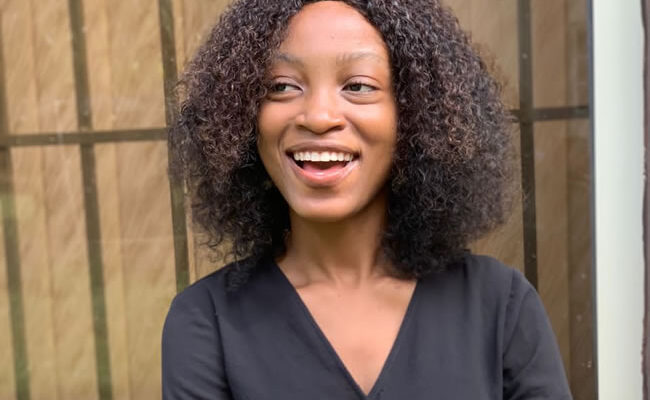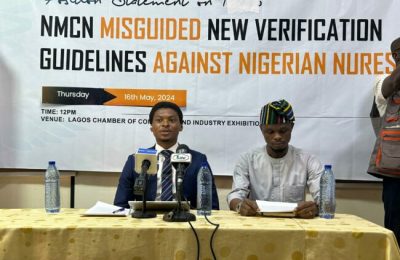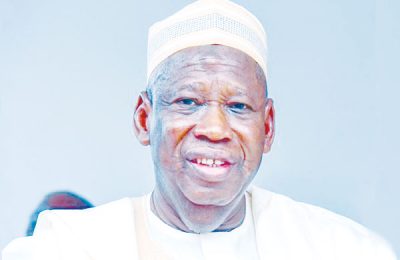A 200-level law student at the University of Ibadan, Deborah Oludimu, who hails from Abeokuta in Ogun State, is a creative that’s passionate about education, good health and well-being, gender equality and climate action – SDGs 3, 4, 5 and 13. In this interview with IFEDAYO OGUNYEMI, the Team Lead for A Pad For Her, an organisation that centres around eradicating poverty in Nigeria, speaks on homeschooling which formed a larger part of her childhood and adolescent years. Excerpts;
A couple of weeks ago, you became the cynosure of all eyes on Twitter when it came to the public light that you were homeschooled. How would you describe the homeschooling process for us?

My homeschooling really started at the end of JSS 1. Before that basically, the bulk of education for me was homeschooling from preschool because I remember learning the ABCs, 123s, how to write and everything taught by my mother at home because I just refused to go to school when I was much younger just like every child cried. So, I have a bit of a medical issue, syndactyly (a condition in which children are born with fused or webbed fingers), which affected my right hand for a while wherein I was in and out of the hospital from 2010 to around 2013. I started secondary school in 2012 and I was in and out of the hospital for that JSS 1 period. I live in Ibadan but I had a surgery in Lagos. So eventually when my whole medical issue was sorted out, I missed JSS 2 and I missed JSS 3 sort of and I was supposed to start again. My mom didn’t want me to start again but to start from SSS 1 and all these schools wanted to rule me out. It was there she asked me if I’d like to study at home. And she got me textbooks, spoke to educators and people my age to know what they’re using in school, etc. And we have always been doing that during the time I was still battling the medical issue.
What kind of subjects did she teach you?

I chose to go to the arts and that means I was taking English Language and Mathematics like everyone else and I was taking Government, Economics, Civic Education, Literature, Yoruba and Christian Religious Studies. She got the textbooks. I started to read them on my own and at my own pace. The only thing I was ever really helped with was my Mathematics because even from primary school, I don’t really like Mathematics that much. Whenever I have issues with it, I’ll go to my dad to help me solve them. I just find mathematics really difficult and I avoid it. Sometimes, I go to my older brother, he was in the sciences, and he would take me through them. Every other thing, I did them myself because my parents were in the sciences just like my brother. Everything was pretty much self-explanatory for me. I just had to sit down with my books and read them and I had to do the practice questions that came with the textbooks and that was it for me.

So I also fancied myself a really competitive person. In 2017, my brother graduated from secondary school, he made all papers and had 302 in JAMB. I challenged myself to get higher than that because we always have this healthy competition at home. When it was time for me to write my final exams, my parents decided to enrol me at a tutorial centre to brush up on everything that I’d been learning while staying at home. It turned out that there hadn’t been much difference between what I did on my own at home and what they were teaching there because I could catch up. Another thing that really helped me was the internet. Growing up, we had this particular room, like a home library, that was just for books. My dad has documents on the computer, so we had access to the computer and the internet. On that computer, my dad installed this software, e-Learner, which had modules across multiple subjects that I used apart from the textbooks that I read. They are not the kind of modules that you see in regular secondary school but they are really similar. The idea for me back then was to read everything I could see because I had more time to myself. It got to a point where I picked up the dictionary to read because I was just bored and I had already read everything I saw. I eventually did three months at the tutorial, I wrote the UTME, I wrote my WAEC and made my papers in one sitting. My first UTME score in 2018 was low and it hurt me to have something around 250. I was told I can’t get into Law with that and I really studied hard for that Post-UTME. I remember that I sleep around by 7 pm, wake up by 2 am and study till 8 am. I sleep from then till 1 pm to study again. In my first post-UTME, I had 81 out of a possible 100 and in my head, I was going to make it and my aggregate score was higher than the cut-off mark for the previous year. But because OAU disaccredited law that year, a lot of people came to UI for post-UTME, and the cut-off mark went higher. It was the highest ever and I didn’t make it that year. I wrote again the following year and I had 290 in JAMB. The post-UTME was more difficult than that of my first attempt but my aggregate score was above 72% and the cut-off was around 70% and here I am now.
What did your mother, father and father who homeschooled you major in?
My brother is also in UI studying Chemistry. My dad studied Computer Science at the University of Lagos. My mum studied Economics at the University of Lagos.
What kinds of jobs were your parents involved in around the time you were homeschooled and how easy was it for them to cope?
My dad was a computer scientist doing IT stuff. My mom did not work for the first 10-12 years of my life. I don’t remember her working during those years. It was in 2014 that she started her own business. Prior to 2014, she was really active in training us. Even after 2014, she was still active with us until around 2017 when her business really broke out and it became a fast-paced thing for her and took up a lot of her time. By then, I was almost done with secondary school anyway, so it didn’t really affect me but at that time, I would say that despite the fact that she wasn’t working, I did a lot of my homeschooling myself because my field and topics are not something that she was familiar with. So, I wouldn’t say if she was working when I was homeschooled, it would have affected me. I don’t think so because she wasn’t really hands-on all of the time. She was hands-on for like 30 percent of the time. My dad was hands-on when I went to him with my mathematical problems, whenever he was around or during the weekends.
Do you think you would have found those post-UTME questions easier if you had gone through the four walls of the classroom?
The questions were much more difficult because the format was different. They changed the format for UTME after 2018 for art students. The way JAMB normally asks questions, and the way WAEC asks questions were completely changed and it was a bit more technical. I wasn’t expecting that because I felt I’d written it before, I know what to do and I know how to read.
Would you say homeschooling and the timetable with which you read naturally make you a nerd?
I wouldn’t say I’m a nerd. I think naturally I’m an introverted person and I love to read. Not all academic books, I just like to read about life. I read a lot of memoirs, I read a lot of African fiction. I basically read everything I saw, and that just made me more of an introverted person than an extroverted person.
Do you still read with that reading schedule or are there modifications to it now?
It’s not the same reading schedule I use now. That’s because I’m not a night person. I read at night then because I wanted to achieve a goal and I was home all day. Now, I get six to 8 hours of classes every day and I’m already tired by the time I get home. Now, I endeavour to read for about four hours per day. Sometimes I read between 5 am and 7 am and later in the evening, I do another two hours. Whenever exams are near, I read between 10 to 15 hours per day because I stop every other engagement including going out. I cut the reading time into two hours per session and rest for about 45 minutes and then again and again.
You were born with syndactyly, what has it been like for you?
Yes, I was born with a condition called syndactyly. For some people, it’s not a painful condition, but it caused a lot of muscle pain in the fingers on my hand. The web here was larger than it is right now and whenever I stretch my hand, the finger turns and it causes a lot of pain that can last for 30 minutes per episode. Before the surgery, I could have about five episodes per day or more, particularly when I write for longer periods. I don’t have random pains again since the surgery unless I stress the hand for too long when writing. Whenever I’m taking my law exams, it causes a lot of pain for me. I couldn’t finish my first law exam. I had to answer four questions but I could only write two and a half. And I had a B when the result came out. Imagine what I could have got if I had finished the required questions.
You had about five to six years’ break from attending regular classes and at the time you went back to classes, first through tutorials and the UI law classes, did you find learning difficult and how would you describe the experience and the transition?
Learning was not difficult for me, it was easy, it came naturally. What became difficult for me was deadlines when I came to the University of Ibadan, and you know throughout my secondary school experience, I never had deadlines, I never had a rigid system to adhere to but when I came here, I have had to go to classes, I have deadlines to meet and I have assignments and it was all just too much because I always had the time to myself and at my own pace but here, I have to do it at the pace of the university. So, that’s a little bit difficult for me to adjust to even now. I get by but I don’t really like that my time is not under my control.
Did you at any point in time get stigmatised because you didn’t come from the regular classroom?
Until the time that I made that tweet, not many people knew I was homeschooled. It was after the tweet went viral that many people expressed their surprise and disbelief at the fact that I was homeschooled.
How did you receive their reactions?
A lot of people called me and stopped me in class trying to confirm if I was really homeschooled. It was really on the WhatsApp status of a lot of my classmates. I didn’t expect it to go that viral. The tweet had about 1.3 million impressions and 13,000 likes and I didn’t envisage that.
Are you now chuffed with the popularity that came with the viral tweet?
As I said earlier, I’ve always been passionate about education. When I made that tweet, a lot of parents or people reached out to me personally saying that they’re trying to homeschool their kids but don’t know how to do it. They want to know how to go about it. They wanted to know how it affected me positively, so I called my parents and told them what I did. And I asked them if it will be possible to have a discussion with parents who fancy the idea of homeschooling so as to put them through how they did it for me. I wasn’t the only one who was homeschooled but I was homeschooled for longer. Some of my siblings were homeschooled for a year or two. Whenever they return to regular class, they are ahead of their peers. So, we want to do our first session in May. I put out a Google Form and about 150 people filled it.
Back then and now, what is your ambition?
Like every other child, I wanted to be a doctor, then I wanted to be a banker and then I realised I want to be a lawyer. If I would ever pursue a career in law, it would be in tech and IP law. I’m really passionate about intellectual property but as of now, I am heavily considering social impact. I currently run an initiative dedicated to eradicating period poverty and I really believe in the power of social impact to change the world, bring up people, pick up problems and shape the world.
Prior to 2020 when I heard about period poverty for the first time, it had never crossed my mind that people do not have what is needed to manage their menstruation or that medical practitioners dismiss period pains or that there was so much about menstruation. I began to read and speak to experts about it and I came across a UNESCO data that says two out of every ten Nigerian girls miss school as a result of period poverty. It was then that I decided to do something about it. Even when I started an organisation that sets up pad banks in school, people take it with so much triviality and say “is it not just pads” without considering how it affects the girl-child. I started by writing about period poverty, and safety tips on how to manage menstruation. For instance, when some ladies experience period pain, they resort to NSAIDs which is one of the leading causes of ulcer and ulcer is growing to be a girl thing because of the abuse of painkillers. We used shared tips in order to correct the misconceptions and communication gaps with menstruation for about six months before we had our first outreach on May 28, 2022, to commemorate World Menstrual Hygiene Day. We reached out to four schools in three different states – Oyo, Lagos and Osun States. We had market sensitisation at Bodija Market, Ibadan and people shared thoughts with us about what they didn’t know about menstruation. That fueled me to do more. In October, we had another outreach in five states – Lagos, Oyo, Osun, Ekiti and Edo States – by setting up pad banks in schools on a sustainable scale to cover SDG 4. We didn’t want the girls to miss school. Whenever parents can’t get pads for their children, the girl can go to the pad bank, drop her name, state her reason for not having a pad and get one from the bank. She doesn’t have to miss school. We have been going back to the said schools to sensitise them and collate the data from the pad banks and drop more pads for them.
Is the management of your school aware of your condition with the hope to make exams easier for you?
After I saw the result of the first exam that I said I couldn’t finish, I knew I wasn’t going to get an A but I cried to my parents and told them about it. They wanted to get my medical records and submit a letter to the dean in order to get extensions for me during exams and all sorts. But I wasn’t someone who loved public attention. I felt that it would be weird that others have submitted and I am allowed to write for extra minutes. I felt that the whole school would want to know and eventually know what was wrong with me. I wrote four exams last semester and what I do now is to practise past questions and attempt to write as much as I can to get me accustomed to the exam structure and timing. This helps me to gauge how much I can write before my hand turns. So, I time myself not to write on more than a certain number of pages when answering each question. I haven’t seen my result for that exam and I’m confident that it will be good. But if it isn’t good because I didn’t write as much as I would have wanted, I’ll tell my parents to go ahead with informing the school.
In what ways did homeschooling affect your social skills?
It affected my social skills a bit because I realised, when I started going to the tutorial, that I wasn’t really free with my peers. I didn’t know how to communicate with my peers as much. There are things that they did that were alien to me. Some of the things they brought and developed from the regular school and I’m just familiar with my mom, my dad and my siblings. I have a really good relationship with people older than me. I can communicate with adults and kids but then, it was sketchy with my peers. I’m balanced up now though. I spoke to them more and I observed them to understand how this or that is done. I’ve been in school for a while now, so that’s balanced out. For anyone who is seeking to homeschool their children, I would say that if you’re concerned about the social skills aspects, you can homeschool them and bring them in contact with their peers through other extracurricular activities. Take for instance learning an instrument, learning to swim or those children’s clubs because we didn’t have because my parents didn’t take us out that much. I just had church. I am sure if they balance homeschooling with extracurricular activities, the child will be good.
YOU SHOULD NOT MISS THESE HEADLINES FROM NIGERIAN TRIBUNE
May Nigeria never witness another Buhari’s govt — Primate Ayodele
The leader of INRI Evangelical Spiritual Church, Primate Elijah Ayodele has said President Muhammadu Buhari-led Government performed…
‘IDAN’: All you need to know about trending Nigerian street slang
The hashtag ‘Idan’ is the latest Nigerian street slang that has been trending on social media for…
Murphy Afolabi: 7 things you probably don’t know about late Nollywood actor
Nigerian sensational actor and filmmaker, Murphy Afolabi, reportedly died on Sunday, barely 24 hours after…
WEEK BRIEF: 10th NASS’ power tussle, Seun Kuti’s assault on police… other top news
THE ongoing tussle for the principal office positions of the 10th National Assembly by the top members All Progressives Congress (APC) has…
SPOTLIGHT: Dennis Bergkamp, ‘non-flying Dutchman’ blessed with unrivalled skill, technique
Dennis Nicolaas Maria Bergkamp, born on May 10, 1969, in Amsterdam, Netherlands, is widely regarded as one of the…
Ph.D graduation of a Hausa-Yoruba Nigerian in America
Last Saturday, I attended the PhD graduation of a treasured mentee of mine by the name of Abdulbasit Kassim at Rice University in…








